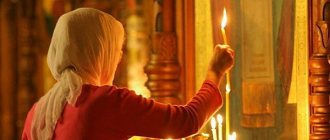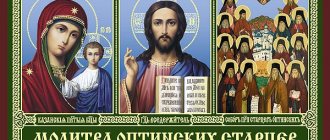The attitude of the church towards Islam has always been ambiguous and has deep theological implications. Islam contradicted the medieval ideas of Christians about the divine plan of history and even seemed to them a kind of religious-historical challenge. At times, Orthodoxy’s attitude towards Islam could even be called overly emotional. However, for more than a thousand years, Muslims and Christians have lived in peace and harmony, always ready to help each other.
An excellent example of mutual assistance between Muslims and Christians is the case in the American city of Sacramento (California) in April 2012, when the local Christian community was left without a temple. Muslims came to her aid, offering the center of their League to hold a festive Easter service.
The attitude of Islam to Orthodoxy and other religions
The Quran was revealed not only to the Arabs, but to all people, including Jews and Christians. Prophet Muhammad (peace and blessings of Allah be upon him) is the successor of the prophetic line, including Ibrahim (Abraham), Musa (Moses) and Isa (Jesus) (Peace be upon them all), and the Quran is a continuation of the previous Scriptures that were revealed by the One God.
Today, it is quite common to believe that the Koran preaches intolerance and violence, and the Prophet Muhammad (peace and blessings of Allaah be upon him) taught his faith while holding a sword in one hand and the Koran in the other. It is impossible to imagine anything further from the truth. Islam, a religion of love and tolerance, calls for faith in all the prophets of the world and to treat any faith with great respect.
The Koran says: “There is no compulsion in religion. The straight path has already been distinguished from error. Whoever does not believe in taghut, but believes in Allah, has grabbed the most reliable handle that will never break. Allah is the Hearer, the Knower” (2:256). This affirms the respectful attitude of Islam towards other religions (Christianity, Buddhism, Judaism) and the complete freedom of the individual in religious preferences and the absolute independence of a person in choosing his path.
The Koran allows fighting solely for protection from enemies and oppressors, to establish freedom of religion, to end religious persecution and to protect houses that are used for worship (we are talking about temples of all religions, including mosques). “They were unjustly expelled from their homes simply because they said: “Our Lord is Allah.” If Allah had not allowed some people to defend themselves from others, the cells, churches, synagogues and mosques in which the name of Allah is greatly remembered would have been destroyed. Allah certainly helps those who obey Him. Verily, Allah is All-Powerful, All-Mighty.” If the persecution ends, military action should be abandoned and a truce accepted.
There are also frequent statements that Islam prohibits friendship with representatives of other religions. But how can one believe this, given that the Holy Book allows a righteous Muslim to marry a woman of a different religion? The relationship of loving spouses is permeated with a sense of friendship more than any other. And even if in this case the difference of religions is not a hindrance, there is no reason to talk about the prohibition of other friendly relations.
The only prohibition concerns friendship with enemies and aggressors. Allah forbids respecting those who waged war against Muslim believers because of their religion, expelled them from their homes and helped expel others.
From the editor
Dear reader!
We present to you a book by Daniil Sysoev, a famous public figure and priest, whose earthly life was tragically interrupted on November 20, 2009. According to one version of the criminal investigation, the murder was committed on religious grounds: because of his missionary and preaching activities among Muslims. The deceased was repeatedly threatened by representatives of an extremist group.
This publication “Islam. Orthodox View" is a printed version of video lectures by Fr. Daniel, distributed on the Internet. In them, the author, in the tradition of Orthodox comparative theology, provides a critical analysis of Islamic doctrine, and also analyzes the theological and mystical aspects of the life and work of the founder of Islam, Muhammad. Deep knowledge of the Holy Scriptures and Holy Tradition, broad erudition allowed Fr. Daniel to create a vivid example of Orthodox polemics.
The publishers transferred the author's oral presentation to a sheet of paper, while preserving the personal intonations and individual features of Fr. Daniel. A lot of scientific work was carried out: quotations were checked in accordance with the original, inaccuracies were edited, links to the source and brief comments were provided. All quotes from the Koran are given according to the source: Koran / Translation from Arabic by Acad. I. Yu. Krachkovsky. M., 1990.
The book contains three chapters: 1. About Islam; 2. About Muhammad; 3. Answers to questions, as well as a biography of Fr. Daniel and “The First Hierarchal Word of the Patriarch of Moscow and All Rus' Kirill after the funeral service of Priest Daniil Sysoev.” Each chapter reveals not only the basic concepts of the Muslim faith, but also shows the saving differences of the Christian faith. Despite the fact that Fr. Daniel always spoke in a reasoned and balanced manner, supporting his arguments with quotations from sources; not all modern religious scholars completely agree with his conclusions. The speeches of Daniil Sysoev served as a reason for discussion among Orthodox theologians.
Father Daniel was distinguished by his originality of thought and creative activity. He had the gift of a true preacher and missionary, who revealed to his listeners the only path leading to true joy in a sorrowful world - the path to Christ. We hope that the living word of Fr. Daniel will become help and support for many who seek the true meaning of man’s earthly path. May his memory be blessed.
Forgive us, dear readers, for possible omissions.
Islam's attitude towards Jews
The negative attitude of Islam towards Jews is actively discussed in the media. However, anti-Semitism, like any other type of racism, has no place in Islam. There is not a word in the Koran about contempt for the Semitic race. On the contrary, the Holy Scriptures talk a lot about the “children of Israel”, as the descendants of the Prophet Ibrahim (Peace be upon him). God chose the Jews to carry out an important mission, sent them many prophets and gave them what he did not give to others. The Creator elevated them above other peoples of the earth and gave them many advantages.
Only Jews are criticized for turning away from the true command of God and mocking the Prophet Muhammad (peace and blessings of Allaah be upon him) and the Last Revelation. Similar criticism is found in other Scriptures, including the Old Testament. And it should be taken as a reminder and warning to everyone who deviates from fulfilling the divine command.
Attitude of Muslims towards non-believers
It is often said that Islam is a tolerant religion.
Then the question arises: if Islam is tolerant, why do some Muslims build relationships according to the “us” and “them” scheme? People who were previously always ready to help their neighbors, celebrate holidays with their families and engage in social work, after becoming Muslims, begin to think that they have nothing in common with “those” - with people who were their friends for only a few days or weeks back. Very often they call non-Muslims “kafirs,” using this word as an insult. What's the matter?
As in many other cases, the problem here is not Islam, but a misunderstanding of it. Muslims have lived among followers of other religions since the Revelation. Sometimes they were rulers.
Already 18 years after the death of the Prophet Muhammad (PBUH), Muslims, led by Sad ibn Abu Waqqas, went to the east coast of China. They received permission from the emperor to settle there and build a mosque that still stands today.
It seemed that life among non-Muslims did not create insoluble problems for them. As we study history, we understand that the problems that Islamic minorities face when non-Muslims are in power are not new. We must also remember that Muslims often found themselves in the minority, even when their brothers in faith were in power.
Dialogue with Islam from the Orthodox point of view
| Archbishop of Tirana and All Albania Anastasius |
The Orthodox Church of the East met with Islam already in the first decades of its appearance through various dialogues.
As is known, the religion of Islam originated near the geographical area where Orthodoxy flourished, and later captured those regions in which the Orthodox faith developed (i.e. Palestine, Egypt, Syria, Asia Minor, etc.). The meeting with Islam took not only the form of polemical clash and confrontation, but also turned into a long silent coexistence and, if you like, symbiosis and often found expression in the spiritual sphere in the form of theological dialogue, which made efforts to define various positions, as well as religious forms and experience. I. Historical review
1. Three phases of the Byzantine-Islamic dialogue
Christian Byzantium created an entire defensive system in political and social reality, taking into account the aggressive aspirations of this new religion. As part of this defensive tendency, a number of theological works appeared that represented an external form of dialogue, “conversation” between representatives of Islam and Christianity. Some of these writings apparently summarized actual disputes between Christians and Muslims. The Byzantines, living next to the cradle of the Muslim world, had the opportunity to learn about Islam from its direct sources - something that was later revealed in the mood of Christians in the West, who lived, however, geographically and sociopolitically at a great distance. Analysis of the Koran and its criticism as a whole, together with the translation of many provisions into Greek, were carried out already in the 9th century by Niketas of Byzantium, a little earlier than Photius, while the first Latin translation of the Koran appeared much later, only in the middle of the 12th century.
A)
In general terms, we can observe a certain
evolution
.
In the first phase
, which covers the period from the middle of the 8th century.
until the 9th century R.H., their position was rather ironic and dismissive
. Saint John of Damascus († c. 750 or 784), being the first Christian to practice Islam, underestimated this new religion, considering it as something frivolous. Just as an example, Damascene translated some provisions of Islamic teaching, which he characterized as “ridiculous.”
More methodically, Theodore, bishop of Paran or Carrai in Mesopotamia, surnamed Abukarras († 820 or 825), came into contact with the new religion. His work “Against the Heresies of the Jews and Saracens,” written in a dialogical form, should be considered as the first serious attempt to understand Islam, but also to confront it. The works of the two above-mentioned theologians bear the stamp of living experience, which is based on direct contacts with Muslims and personal conversations. These two knew the original Koran and lived among the Muslim population.
In the second phase
(mid-IX - mid-XIV centuries) the center of anti-Islamic literature moved to the capital of the Byzantine Empire. The amazing successes of Islam, but above all its spread, began to become a nightmare for the Byzantines. They saw that this religion, with all its logical and moral shortcomings (perhaps precisely for this reason), posed a huge danger to the empire. Thus, a decisive defensive tactic is formed. During this era, many works were published (for example, Theophan the Confessor, George Amartol, Efvimiy Zigavin, Nikita Choniates, Bartholomew of Edessa, etc.). Of these, the most typical is the work of Nikita of Byzantium, “Refutation of the Bible distorted by the Arab Mohammed.” This is a typical polemical work that tried to prove that Islam is an incoherent religion.
Third phase
Byzantine opposition to Islam (mid-XIV - mid-XV centuries) is distinguished by the fact that it becomes more moderate and objective. In debates and dialogues, the main roles are played by such outstanding Byzantine personalities as St. Gregory Palamas († 1359), the monk Joseph Bryennius († 1383) and emperors such as John VI Palaiologos († 1425). These Byzantines can be considered the pioneers of sober Christian-Islamic dialogue. I would especially like to present three typical examples: the dialogues of St. Gregory Palamas, Emperor Manuel II Palaiologos and Patriarch Gennadius Scholarius, who, in my opinion, are not very widely known. However, I will give specific examples briefly.
b)
The main theoretical provisions of the Islamic-Christian, Byzantine dialogue can be reduced to the following:
At first, the Byzantines viewed Islam as a variation and revival of Arianism. Muslim criticism concerned mainly the Divinity of Jesus Christ and the dogma of the Holy Trinity and, in connection with the latter, turned against specific forms of Christian cult and incongruities of the Christian faith.
Christian criticism had the main target of the personality of the founder of Islam in order to challenge his rank as a prophet. The main arguments were that Muhammad was not foretold by the prophets; that he had no evidence of his revelations; that he performed no miracles at all; that he did not foresee the future; and in general, his morality was not within the appropriate parameters. Most Byzantines believed that Muhammad was serving the cause of the Antichrist, that he was a harbinger of the end times. These frivolous definitions were later discarded, at least in official texts. In any case, the most popular battlefield with Muslims remained the difference between the teachings and lives of the founders of two religions - Jesus and Muhammad.
Along with this, Christian authors oppose the Koran. Comparing the Koran with the Holy Scriptures, they showed the shameful distortions, misunderstandings and inconsistencies of the former and fiercely fought against the Muslim point of view, according to which the Koran is the direct word of God. Through historical analysis of interpretations and teachings, they came to the conclusion that the holy book of Islam was a step backward in theological and moral teaching. In particular, family law (laws relating to marriage and sexuality), the views of the Koran in connection with the “holy war”, slavery and, finally, in connection with materialistic ideas about the afterlife with the provision of gastronomic and sexual pleasures were subjected to sharp criticism.
The Byzantines carried out attacks against Islamic points of view, as well as defense against Muslim criticism, using their philosophical stock as a basis and, above all, with the help of the evidence of Holy Scripture. Regardless of whether the arguments they used were always convincing or not, these Byzantine writings show that even for these two religions there is a common basis of meaning that makes “dialogue” possible. Such a common language for dialogue does not exist between Christianity and other religions, such as Hindus.
2. Pioneers of sober Christian-Islamic dialogue
The Byzantines can be considered the pioneers and forerunners of the Christian-Islamic dialogue, which today is gaining worldwide scope. To illuminate the issue even more fully, I will develop the topic using three typical examples, which, in my opinion, are not well known.
A)
The atmosphere of Islamic-Christian dialogue in the texts of Gregory Palamas († 1359), who was first an Athonite monk and then the Archbishop of Thessalonica, breathes with special grandeur and specific delicacy.
In these dialogues - which seem to be summations of actual discussions - Gregory Palamas is shown to be clear and firm in Christian positions and, at the same time, calm and moderate in relation to Muslim reaction. Gregory wanted to convince his interlocutors: therefore, he relies on theses that are common to both religions - for example, he begins with the concept of the Divine, as Muslims understood it based on the testimony of the Koran about Christ, the Word of God. “Only God is Omnipresent and Eternal: Beginningless, Unchangeable, Infinite, Strong, Indivisible, Unmerged, Limitless (he [Palama] avoids the term “Father”)
... Therefore, God is the Only One Who exists without a beginning, but not without Wisdom... for He - wise - therefore the Word of God is the Wisdom of God.” “But the Word was never without the Spirit, which you Turks also recognize - therefore you must say that Christ is the Word of God and the Spirit of God, the One who is not separate from the Holy Spirit... since God has always been and never will be without Spirit and Wisdom." For God in three Persons, Palamas uses the following example: “As the radiance of the sun is born from the sun, so the ray of the sun comes from the same.”
The argumentation of Gregory Palamas turns out to be dialectically very sophisticated. He does not avoid critical situations in order to maintain an outwardly harmonious impression. As for his attitude towards Muhammad, Gregory answers nobly, but unequivocally: “He who does not believe the words of the teacher cannot love him: therefore, we do not love Muhammad.” He views him, like his Byzantine predecessors, as generally devoid of prophetic traits and miracles and, for this reason, untrue. Regarding the usual Muslim argument that the successes and victories of Islam demonstrate its superiority, Gregory Palamas responds by reminding that “[Islam] is born of war, sword, murder and robbery; Of all this, nothing comes from God, Who is truly Good.”
Throughout the dialogue, the saint pays special attention to not offending the religious feelings of his interlocutors. Despite the fact that there is no mutual understanding, an atmosphere of mutual respect prevails. “And then the Turkish nobles rose, said goodbye, full of respect for the Thessalonian archbishop, and left.” As soon as he noticed that his interlocutors were in a difficult situation, he tried to defuse the tense situation with delicate humor. “After I had amused them with a joke, I again told them: If it is possible for us to agree, then we will have the same teaching.” Thus, sympathy remained, despite the fact that the negotiations were fruitless: however, on the Muslim side, hope was expressed: “The time will come when there will be agreement between us.”
b)
Another outstanding Byzantine figure who described in gentle terms the current problems of Christian-Islamic dialogue was Emperor Manuel II Palaiologos († 1425). The work that has come down to us specifically refers to a “dialogue” (“a discussion that took place with a certain Persian in the office of mudarris in Ancyra of Galatia”); this happened (1390 or 1391) when Manuel was in Prussia at the Turkish court, where he had the opportunity to talk with Muslim experts on theological topics. The first of the 26 discourses contain criticism of various theological views of Islam, and the rest concern the theological exposition of basic Christian tenets and moral principles. In his work, Manuil avoids any contemptuous or derogatory expressions of ancient Byzantine anti-Islamic literature. An atmosphere of real objective dialogue is created. The first begins like this: “After dinner, we sat down near the fire and the old man (Muslim) did the same, according to his custom, and with us his children - two sons, endowed with intelligence and wisdom and supporting the speech of their father. The old man turned to me: “If it is not difficult, please listen to me; I would like to talk to you about what I have to say...” The entire work shows that Manuel was an outstanding theologian and a polite interlocutor, seriously interested in real dialogue with Muslims.











